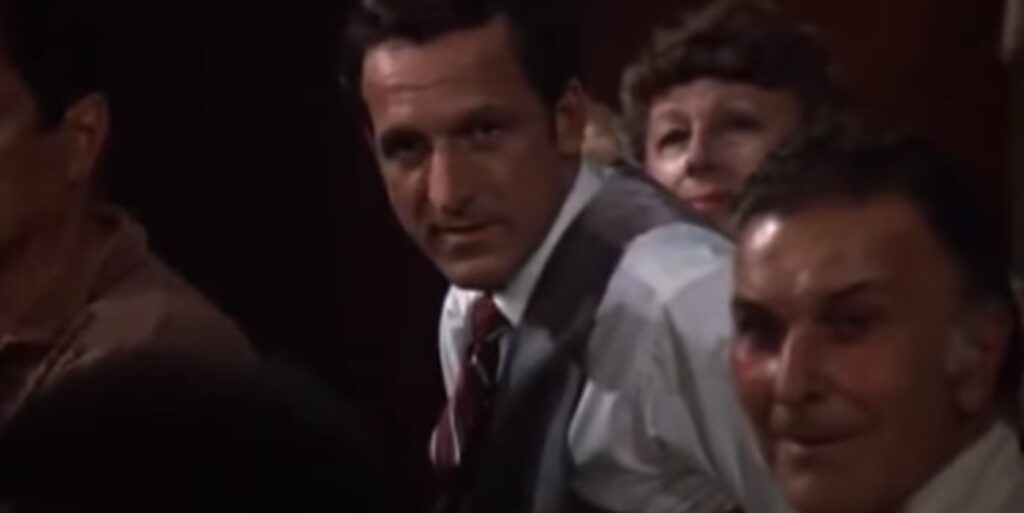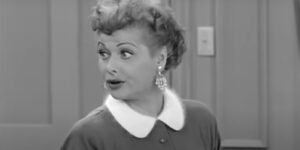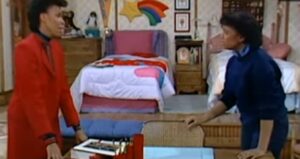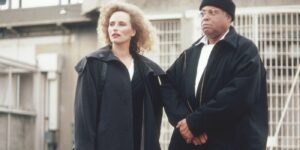
Today, we look at how a simple greeting changed Hill Street Blues forever.
This is “All the Best Things,” a spotlight on the best TV episodes, movies, albums, etc.
This is a Year of Great TV Episodes, where every day this year, we’ll take a look at great TV episodes. Note that I’m not talking about “Very Special Episodes” or episodes built around gimmicks, but just “normal” episodes of TV shows that are notable only because of how good they are.
One of the most important TV series of all-time was the 1980s police drama, Hill Street Blues, which drew a great deal of acclaim for its complex serialized drama. I certainly don’t mean to suggest that TV dramas were never serialized before Hill Street Blues, but it is clear that the LEVEL of serialization in Hill Street Blues marked a dramatic shift for TV dramas, and that its great critical success (and decent enough commercial success…eventually) helped usher in a brand-new age of TV dramas.
So there are a number of episodes that I could start with (and trust me, like All in the Family before it, we’re going to be seeing a lot of Hill Street Blues over the course of this year. Oh, by the way, I forgot to note another “rule” for this year of great TV episodes. I will only feature any given TV show just once a month. So the maximum amount of episodes of All in the Family or Hill Street Blues or any show this year will be twelve. And, well, let me give you advance warning that there WILL be twelve episoes of All in the Family or Hill Street Blues each this year), but I’ve decided to go with the two-hour Season 1 finale. You could argue that a two-hour finale would be a “gimmick,” but I don’t think that’s fair. The last episodes of Season 1 were unusual. Hill Street Blues debuted as a midseason replacement in 1981, and aired a typical 13 episodes, and wrapped up in March. Along the way, NBC ordered two additional two-hour movies (later broken down into two-part episodes for returns and syndication) as a way to draw some attention to the show. That’s why I think you could at least argue that these two two-hour episodes were “gimmicks.” I just don’t think it’s a fair description, as these episodes are otherwise just normal episodes of the series.
In any event, while Hill Street Blues was very much an ensemble, there was clearly a lead actor, Daniel Travanti’s Frank Furillo, the Captain of Hill Street Station. Frank was a great guy, and an excellent commanding officer. However, even in the first season, there were complaints that in a show filled with realistic (if over-the-top, at times) characters, that Furillo was just TOO perfect. His critics ON the show nicknamed him “Saint Francis,” but that’s also sort of how he was viewed to a certain extent.
Well, in the last two two-hour episodes, Kiel Martin’s detective character, J.D. LaRue, began to have a severe problem with alcohol. Martin was a recovering alcoholic in real life, and I assume he brought that experience to bear in the character, because J.D.’s fall to the bottom was BLEAK. In the first of the two-hour episodes, LaRue’s drunkneness nearly gets his fellow detective, Mick Belker (Bruce Weitz) killed, and then in the first half of the finale, LaRue nearly gets himself and his partner, Neal Washington (Taurean Blacque) killed, and the ever-loyal Washington, who put up with A LOT with J.D., finally has had enough. Washington had his own plot anyways, as a racist cop shot a Black suspect, but Washington was pretty sure that the racist cop was innocent, and Washington was too noble to let an innocent man take the fall when he was actually doing his job the right way for a change, so Washington clears the cop’s name, even though the Police Chief Daniels (Jon Cypher) has already written the cop off, planning to offer him as a sacrificial lamb to the public. Even after Washington succeeds, Daniels seems almost more annoyed than anything that the cop was cleared, as he knows that the public will just assume that they covered up the crime.
Anyhow, Furillo eventually gives LaRue an ultimatum, either go to Alcoholics Anonymous or be transferred to another precinct. LaRue knows he would never last in another station (other Captains are not as tolerant as Furillo), and he drunkenly quits the force, arguing that Furillo just doesn’t understand what he has to deal with. However, after an awful day being unable to even get a drink because he is broke, LaRue ultimately goes to A.A. near the end of the episode.
He introduces himself as John, and says that he thinks he is an alcoholic. Everyone at the meeting says hello, and then we hear, “How are you doing, J.D.?”
And there is Furillo. Yes, the “perfect” Furillo is an alcoholic (Travanti himself was also a recovering alcoholic). Martin’s performance when he recognizes Furillo, and realizes that Furillo truly has had his best interests at heart all along, is just amazing. It’s such a wonderful scene. Furillo’s alcoholism was a constant plot point throughout the rest of the series.
Of course, though, the episode doesn’t end there, but with Officers Lucy Bates (Betty Thomas) and Joe Coffey (Joe Molinaro, who had made his debut on the series in the first two-hour episode. Coffey keeps on hitting on Bates, who clearly admires the attention, but doesn’t want to get involved with another cop) making a routine traffic stop when the guy they pull over shoots Coffey as he comes to the front door of the car. As I noted in an old TV Legends Revealed, Coffey was initially killed instantly when the episode aired, but when they broke the episode into two for reruns and syndication, they reshot the scene so that he isn’t obviously dead, as the show’s producers (creators Michael Kozoll and Steven Bochco, and Story Editor Anthony Yerkovich. The three men wrote the episode together) decided to make Coffey a regular cast member in Season 2.
Okay, if I’m going to have 362 more of these, I could use suggestions, so feel free to email me at brian@poprefs.com!










Thank you. I enjoyed the insights on Hill Street Blues.